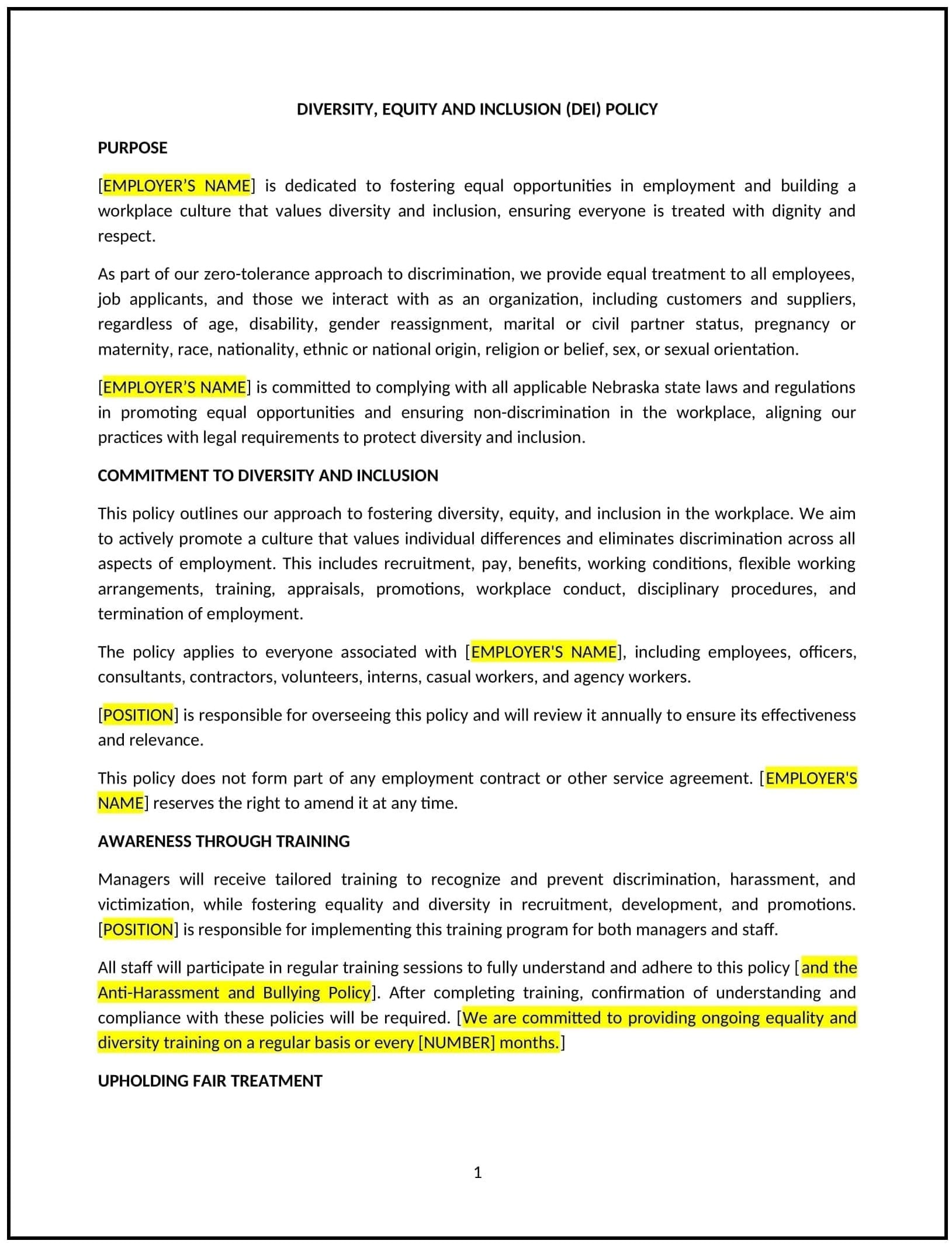Diversity, equity, and inclusion (DEI) policy (Nebraska): Free template
Got contracts to review? While you're here for policies, let Cobrief make contract review effortless—start your free review now.

Customize this template for free
Diversity, equity, and inclusion (DEI) policy (Nebraska)
A diversity, equity, and inclusion (DEI) policy helps Nebraska businesses define their commitment to fostering a workplace that values and supports diverse individuals, ensures fair treatment, and creates an environment where everyone can thrive. This policy outlines the business’s approach to promoting diversity and inclusion in recruitment, hiring, training, promotions, and day-to-day operations, while ensuring that all employees are treated equitably. It also addresses steps to prevent discrimination and unconscious bias, and provides a framework for creating an inclusive environment for all employees, regardless of race, gender, sexual orientation, disability, age, or other factors.
By adopting this DEI policy, businesses in Nebraska can create a more inclusive, equitable, and productive work environment, while also benefiting from the diverse perspectives and skills of a broad workforce.
How to use this DEI policy (Nebraska)
- Define diversity, equity, and inclusion: Clearly outline what each of these terms means in the context of the business, emphasizing the importance of diverse backgrounds, perspectives, and experiences in the workplace.
- Establish DEI goals: Set measurable goals for diversity, equity, and inclusion, such as increasing representation of underrepresented groups in hiring, promoting equitable opportunities, or providing inclusive training programs.
- Outline recruitment and hiring practices: Specify how the business will ensure diversity in recruitment, such as using inclusive job descriptions, engaging with diverse candidate pools, and providing fair interview practices that minimize bias.
- Create training programs: Provide ongoing DEI training for employees at all levels, including training on unconscious bias, inclusive leadership, and cultural competency, to support a more inclusive and respectful workplace.
- Promote an inclusive culture: Set expectations for how employees should contribute to an inclusive culture, including being respectful, listening to diverse perspectives, and supporting colleagues from all backgrounds.
- Address discrimination and harassment: Define zero-tolerance policies for discrimination, harassment, and microaggressions, and outline how complaints will be handled and resolved.
- Provide support for underrepresented groups: Offer resources and support systems for employees from underrepresented groups, such as mentorship programs, employee resource groups, or flexible work policies.
- Monitor progress: Regularly assess the business’s progress on DEI goals, reviewing data on diversity, equity, and inclusion in recruitment, retention, promotions, and employee satisfaction.
- Review and update: Periodically review and update the policy to reflect changes in the business, evolving DEI best practices, and any changes in Nebraska laws or regulations related to diversity and inclusion.
Benefits of using this DEI policy (Nebraska)
This policy provides several benefits for Nebraska businesses:
- Improves workplace culture: A strong DEI policy creates an environment where employees feel valued and respected, leading to improved morale, collaboration, and overall job satisfaction.
- Attracts diverse talent: Companies with a commitment to diversity and inclusion are more likely to attract a broader pool of candidates, enhancing the talent pool and bringing in employees with diverse perspectives and skills.
- Enhances innovation and creativity: Diverse teams bring a variety of viewpoints and ideas, which can lead to more creative solutions and better problem-solving, ultimately benefiting the business.
- Reduces turnover: Employees who feel included and treated equitably are more likely to remain with the company, reducing turnover and improving employee retention.
- Strengthens reputation: Businesses that actively promote diversity, equity, and inclusion build a positive reputation as socially responsible employers, which can attract customers, clients, and partners who value DEI initiatives.
Tips for using this DEI policy (Nebraska)
- Communicate the policy clearly: Ensure that all employees understand the DEI policy and the business’s commitment to creating an inclusive, equitable workplace. This can be communicated through employee handbooks, orientation programs, and ongoing training.
- Lead by example: Encourage leadership to model inclusive behaviors and actively engage with DEI initiatives, demonstrating the importance of these efforts at all levels of the organization.
- Foster open dialogue: Create spaces for employees to share their experiences and perspectives on DEI matters. Consider hosting regular DEI discussions, surveys, or feedback sessions to hear from all employees.
- Measure and report progress: Track the effectiveness of the policy through regular assessments, gathering data on diversity in hiring, promotions, and employee satisfaction. Share progress with employees to maintain transparency and accountability.
- Provide support systems: Offer mentorship programs, employee resource groups, and other resources to help underrepresented employees feel supported and empowered within the company.